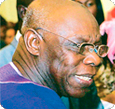Head of United Nations in Nigeria, Mr. Alberic Cacou, has endorsed the Federal Government's review of the sweeping reforms introduced by former President Olusegun Obasanjo.
He, however, urged the Umaru Musa Yar'Adua administration to sustain the economic reforms because they were unparalleled in the West African sub-region.
Cacou, who is also the United Nations Development Programme (UNDP) President Representative in Nigeria, told journalists in Abuja yesterday that it was too early to condemn Yar'Adua's review of the reforms.
His comments came amid growing concern over the government's comprehensive review of the whole gamut of Obasanjo's administration reform agenda.
The UN chief said there was no doubt that the reform policy of the last dispensation was quite fruitful but said that it could still be repackaged.
He said the reforms in public service, governance, anti-graft crusade, banking and debt payment, needed to be continued.
Cacou said: "The previous administration provided some remarkable strides in public service reform, governance, war against corruption, reform in banking sector that is unparalleled in West Africa, debt relief for Nigeria…exit from Paris and London Clubs – are significant strides that need to be continued. No doubt about that…"
He noted that the UNDP would not be concerned by a comprehensive review of education reform details as "where we are concerned is primary education, not reform of education policy. We leave that to government to adjust."
On the Millennium Development Goals (MDGs), Mr. Turhan Saleh, Country Director, UNDP, said that Nigeria could meet the MDGs if the leadership could square up with some challenges in the areas of accountability and public finance management.
Besides, he said there had to be the will to achieve the goals as the challenges were huge.
"Nigeria is one of least income countries. But Nigeria's resources dwarf whatever any one can bring to help in this connection. But how well can the country manage the resources to meet the target is the big question. A lot still has to be done. Is there a will?"
Saleh noted that "Nigeria's best prospect at the moment is for Goal 2: Universal Basic Education (UBE). But maternal and child mortality rate is still very high… the challenges in other areas are still very huge… But in education, Nigeria is doing well."
The UN chief said in macro-economic environment, Nigeria is one of the most benign in 20 years, noting that it is a huge challenge that the country is aspiring to be one of the 20 big economies in 2020.
He said the big question should now be: "How will it affect the people of Nigeria?"
The UNDP Chief Economist in Nigeria, Dr. Ayodele Olusola, said the country requires a $354 million to meet the MDGs, adding that the notion that only the governments should provide the resources for the MDGs should be dispelled.
According to him: "The organised private sector, the development partners have significant roles to play as the private sector, for instance, has been more involved at all levels of education in Nigeria…"
The Deputy Resident Representative, Dr. May Symmonds, said that the State Economic Empowerment Development Strategy (SEEDS) Benchmarking spearheaded by the development partners in collaboration with the National Planning Commission (NPC) was on course. "The goal is to improve processes to achieve accountability in areas such as public procurement, a critical element in corruption index in the country," he said.
Cacou said the UNDP and other such bodies should not be looked up to for solution in the energy sector as their intervention was only in the light areas and advised Nigeria to use "renewable energy."
He said the UNDP had assisted the Central Bank of Nigeria (CBN) to design the new micro-finance policy that led to micro-finance banks.
The UN chief pledged that the UNDP which released a Human Development Report on the Niger Delta in 2006 would continue to support the presidential initiative in the development of the region, local governance process and youth empowerment.
From Martins Oloja, Abuja Bureau Chief
The Guardian
Wednesday, December 19, 2007




